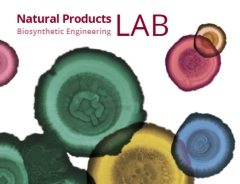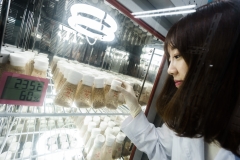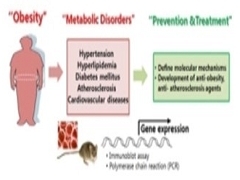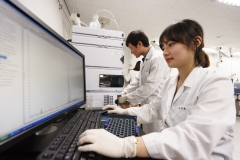Culinary Nutrition & Dietary Lab

- Prof. Young Soon Kim
- Room 558, Hana Science Hall B
- Homepage :
Overview
The Culinary Nutrition & Dietary Lab carries out comprehensive studies that encompass natural science, culinary culture of cooking and dietary habits.
The rapid evolution of Korean culinary culture requires a higher level of research expertise in order to track it. In addition, the contemporary interest in health, longevity and obesity is shedding new light on the health effects of traditional Korean food. In this regard, our lab focuses on both the application of systematic nutritional theory and the honing of experimental capabilities related to the study of traditional Korean food, culinary science and nutrition, in particular in relation to the food service industry, as it is contributing an increasing share to Koreans’ diets. .
In order to create a modern, forward-thinking culinary culture, our lab conducts scientific and systematic research into the full spectrum of culinary issues, including the creation of new presentational styles for oriental and western food, developing existing ingredients as food service offerings, producing new menu items incorporating traditional foods, establishing more efficient cooking tools and utensils , and integrating herbal ingredients into the food service industry, as ‘wellness’ elements.
Main Research Areas
- Culinary culture research and food development
- Development of existing food ingredients as food service offerings
- Practical integration of traditional foods into the food service industry
Laboratory of Lipid Chemistry

- Prof. In-Hwan Kim
- Room 572, Hana Science Hall B
- Homepage :
Overview
As a comprehensive research lab specializing in food lipid, we have recently focused on studying the lipid elements of functional food, developing non-food green materials using food lipid elements like biodiesel, reducing the levels of potentially harmful trans-fat in food, and separating and concentrating organic compounds such as tocopherol, tocotrienol, gamma-oryzanol and physterols through the use of supercritical carbon dioxide.
Main Research Areas
- Application of lipase-catalyzed interesterification to reduce trans-fat
- Concentration of functional fatty acids (i.e. DHA, EPA, PLA and SDA) using selective lipase method
- Synthesis of phytosterol ester and phospholipid high in omega-3 using lipase method
- Lipase technology development to produce cocoa butter substitutes and human milk fat substitutes
- Extraction, separation and concentration of functional phytochemicals such as tocopherol, tocotrienol and phytosterol, using supercritical carbon dioxide
- Synthesis of biodiesel through lipase-catalyzed interesterification to reduce trans-fat
- Development of ultra-low temperature ester interesterification to produce surfactant
Main Research Equipment
- Spectrophotometer
- HPLC 1 with ELSD detector
- HPLC 2 with UV/VIS, and fluorescence detector
- Gas chromatography 1 with FID
- Gas chromatography 2 with FID and TCD
- pH stat titrator
- Karl fisher moisture analyzer
- Supercritical fluid extraction system
- Supercritical reactor with view cell reactor
- Supercritical reactor with magnetic drive
- PBR (Packed Bed Reactor) system for enzyme reaction
- Lab scale oil refining system
- Preparative liquid chromatography
- Vacuum reaction system for enzyme reaction
- Other basic equipment and devices
Functional Interactomics Laboratory

- Prof. Jae-Yong Park
- Room 554, Hana Science Hall B
- Homepage :
Overview
With the aim of understanding the functions of the brain, in particular glia-neuron interaction, our lab has identified membrane protein (i.e. iton channels, GPCR, etc.) interactomics that exist in the glia-neuron membranes in dielectric substances, and researched their networks since 2004. We currently focus our efforts on controlling the functions of the brain through marshalling the membrane proteins, as we work on the development of therapies for cerebral diseases.
Main Research Areas
- Glia-neuron interaction using membrane protein interactomics
- Regulation mechanism of ion channels in the brain
- Ion channels and related cancers
Natural Products Biosynthetic Engineering Lab

- Prof. Je Won Park
- Room 560, Hana Science Hall B
- Homepage :http://npbe.korea.ac.kr/
Overview
Natural medicinal materials are spontaneously created by various land and marine organisms, and they offer a platform for the development of value-added, functional biomaterials with unique chemical scaffold structures. The basic understanding of the natural synthesis process of organic materials within the bio-system helps us to discover the metabolic process of bio-catalysts that play a part in biosynthesis, to commercialize the resulting biomaterials, and to improve their effectiveness. Our lab studies the biosynthesis of natural medicinal materials within the bio-system. In this regard, to make progress in our research, the convergence is essential of many basic and applied disciplines such as biochemistry, molecular biology, medicinal chemistry, metabolic engineering, pharmacology, bioinformatics, and synthetic biology.
Main Research Areas
- Discovery of the biosynthetic processes of the biologic materials present in organic entities
- Re-design of biomaterials through biosynthetic engineering
Laboratory of Nutraceuticals

- Prof. HyungJoo Suh
- Room 570, Hana Science Hall B
- Homepage :http://ku-nutraceuticals.re.kr/
Overview
A food that to a great degree contributes to human health is designated a functional food, which consists of various elements. Functional food is also called nutraceutical, designer food, or pharmafood, which prevents or relieves diseases. Our lab conducts research into functional food processes, including the biological response of protein hydrolysates, response promotion through bioconversion, and the development of food that contributes to healthier skin, and sleep-inducing ingredients.
Main Research Areas
- Utilization of peptide as a functional material
- Promotion of biological response through bioconversion
- Development of skin care-related food
- Exploration of biological response
- Study of sleep-related materials and evaluation of their functions
Molecular Nutrition & Physiology Lab

- Prof. Min-Jeong Shin
- Room 561, Hana Science Hall B
- Homepage :
Overview
As the standard of living has improved, the importance of leading a healthy life has drawn growing attention. Our lab focuses on promoting healthy lives, exploring phenomena that induce diseases, and discovering bioactive substances that can combat diseases more effectively. In particular, we are conducting a range of research, from in-silico research to define disease risk factors by using massive human resource datasets, to in-vitro/in-vivo research to identify the impacts of these risk factors on the signal transmission processes related to diseases. Through these nutritional and genetic approaches to diseases, we aim to help improve the quality of treatments, leading to accurate diagnoses and desirable metabolic outcomes. We also offer guidelines for disease prevention and health management for healthy people.
Main Research Areas
- Study of genomics, protemics and metabolomics, and analysis of their interactions.
- Identification of risk factors and mechanisms of diseases, using massive human resource datasets
Laboratory of Bacteriology

- Prof. Hana Yi
- Room 559, Hana Science Hall B
- Homepage :http://lpb.korea.ac.kr/wp/
Overview
Our lab aims to contribute to the safe co-existence of microorganisms and humans. To this end, we study microorganisms that affect the field of health science, using meta-genome and gene analysis methods.
Main Research Areas
- Analysis of symbiont genomics
Decoding of medically and economically significant bacteria, tracking of RNA modification by phase, and analysis of the interaction between the host and the pathogenic bacterium at the level of the gene - Human microbiome
Analysis of the genetic diversity of human microbiome, which has a significant influence on human health, and its correlation with diseases - Pathogen discovery
Virus and bacteria metagenome analysis, carried out to detect new pathogenic bacteria that pose a threat to the health of humans, plants and animals - Prokaryotic taxonomy
An understanding of the prokaryotic taxonomy system is essential for precise diagnosis and detection of pathogenic bacteria. We focus on correcting inaccuracies in the taxonomy system based on analysis of genetic traits and the discovery of new microorganisms
Molecular Microbial Chemistry Lab

- Prof. Young Hee Lim
- Room 569, Hana Science Hall B
- Homepage :
Main Research Areas
-
Immune system enhancement and disease prevention using bacillus and short chain fatty acid (SCFA)-producing bacteria
The various roles of rumen microorganisms, such as disease prevention, have been a popular topic of research, and they are currently known to play an important part in systemically controlling diseases. Our lab attempts to validate the positive effects of bacillus and SCFA-producing bacteria on health (gut immunity enhancement, extension of life span, and promotion of brain health), and investigates their mechanisms. -
Gut immunity enhancement through the application of natural functional materials
We study how to enhance the application of functional materials which are derived from nature, by using bioconversion and activation. In particular, we focus on stilbene materials with antioxidant functions, the production of functional compounds made of bacillus, and the confirmation of their functions and mechanisms.
Food Microbiology and Safety Lab

- Prof. Soo Hyun Chung
- Room 551, Hana Science Hall B
- Homepage :
Overview
As the quantity and quality of food has significantly improved and various kinds of food have become readily available thanks to the development of food processing technology and globalization, food safety has emerged as an important topic.
Main Research Areas
- Analysis and evaluation of harmful elements in food, including detection and control of pathogenic and/or harmful microorganisms, separation and identification of mold in food and physical environment, and analysis of mold toxins
- Investigation of the features of microorganisms’ metabolism and fermentation in traditional fermented foods, distinguishing of commercially viable and useful bifidobacteria and lactobacillus, production of functional fermentation products of microorganisms, and their intestinal growth and development
Laboratory of Stem Cell and Neuroregeneration

- Prof. Sunghoi Hong
- Room 557, Hana Science Hall B
- Homepage :
Overview
Some diseases have no treatment or cure. In particular, as some cerebral diseases have hitherto been incurable, cytotherapy using stem cells is emerging as a novel therapy for them.
Main Research Areas
- Development mechanisms of incurable cerebral diseases (i.e. Alzheimer’s, Parkinson's disease, Huntington’s disease, and motor neuron disease) and development of cell therapy products using iPS cells and direct converted somatic cells
- Skin cell and hair regeneration using neural stem cells and their byproducts
- Generation of cancer cells, their proliferation mechanisms and cancer therapy using cancer stem cells